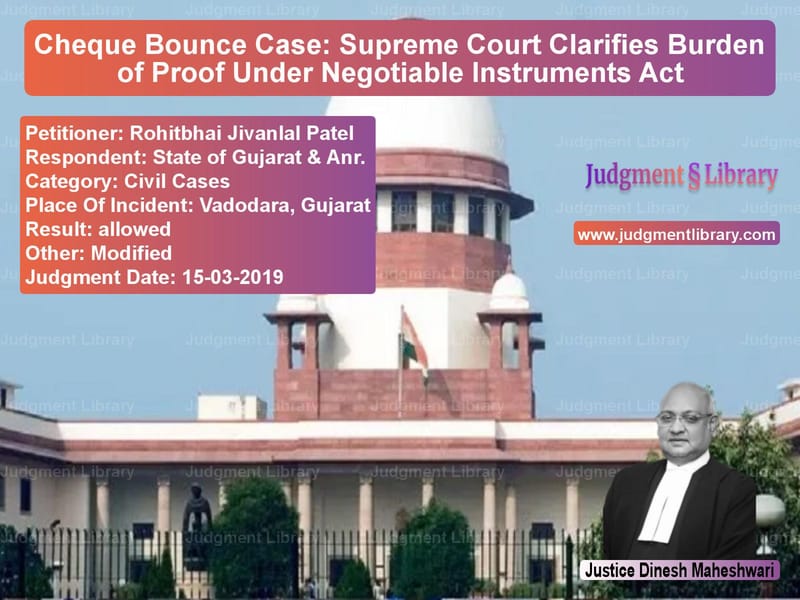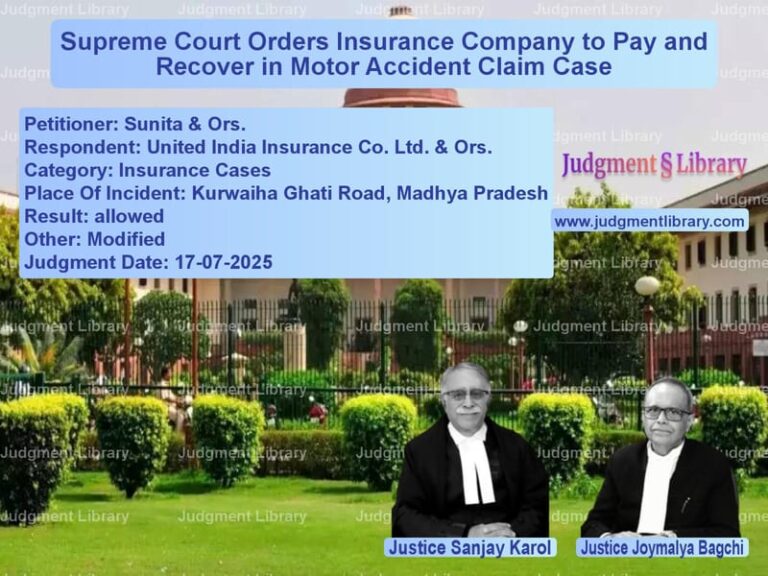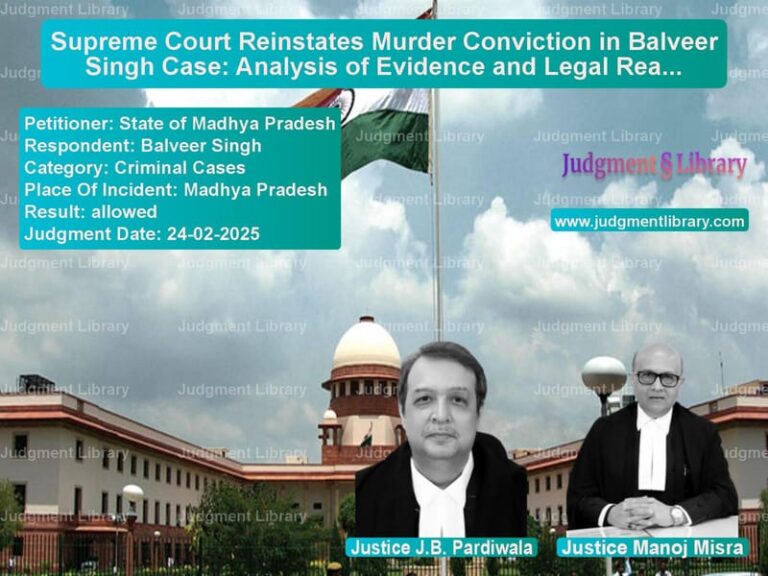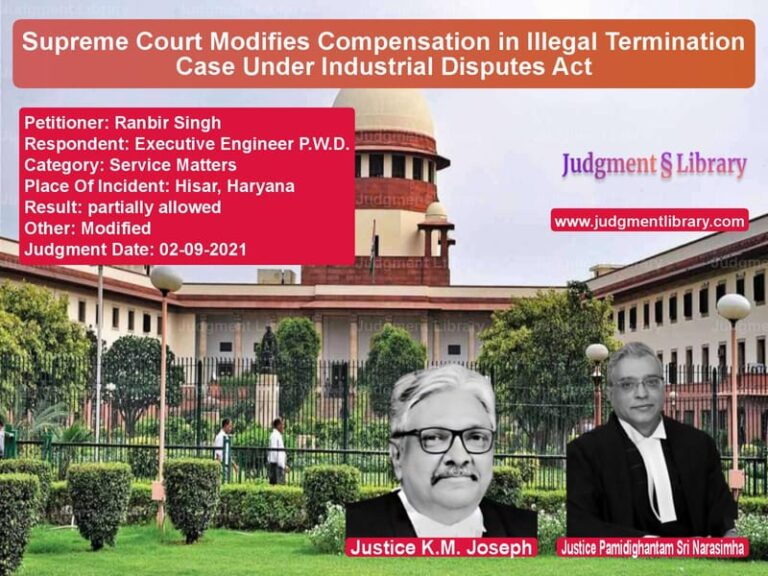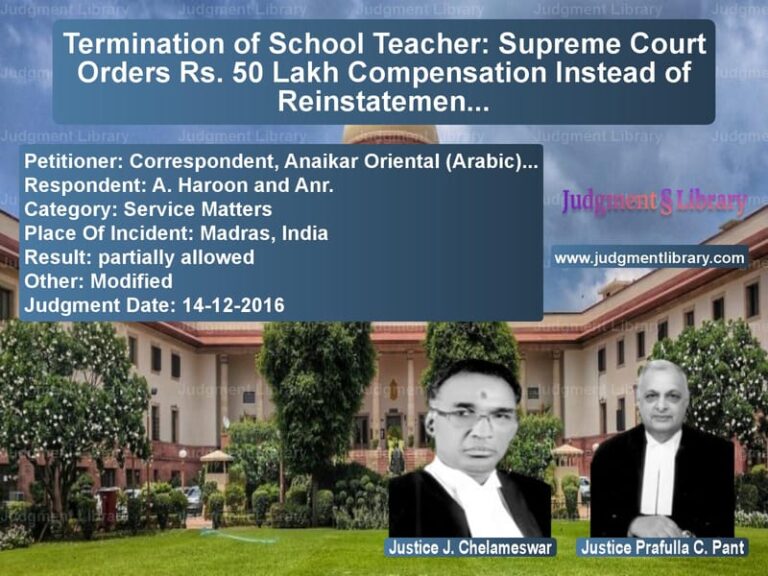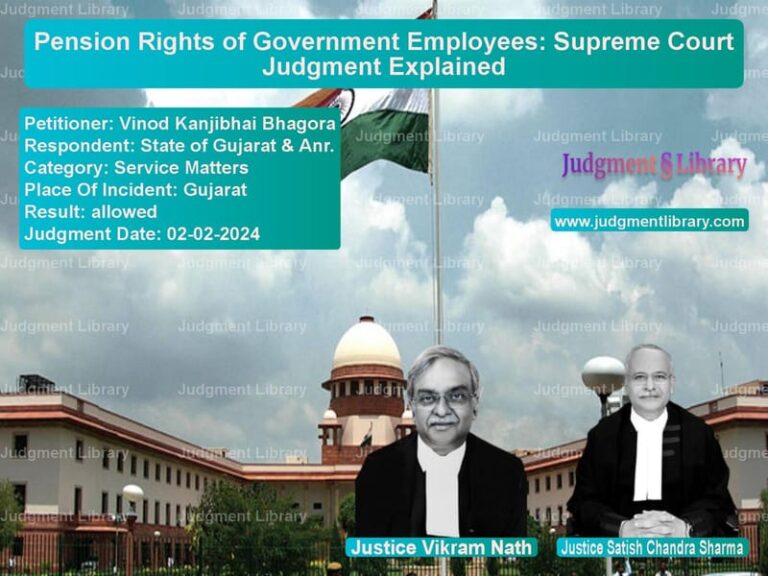Cheque Bounce Case: Supreme Court Clarifies Burden of Proof Under Negotiable Instruments Act
The Supreme Court of India, in the case of Rohitbhai Jivanlal Patel vs. State of Gujarat & Anr., ruled on crucial aspects of cheque bounce cases under the Negotiable Instruments Act, 1881 (NI Act). This judgment highlights the burden of proof, presumptions under Sections 118 and 139 of the NI Act, and the rights of an accused in a cheque dishonor case.
Background of the Case
The case stemmed from seven different criminal complaints filed under Section 138 of the NI Act for dishonor of cheques issued by the appellant (accused) in favor of the complainant. The dispute arose after the accused issued seven cheques worth Rs. 3 lakhs each, which were dishonored due to insufficient funds or account closure. The complainant alleged that the cheques were given as repayment for a loan of Rs. 22,50,000.
Initially, the trial court acquitted the accused, but the Gujarat High Court reversed this decision, holding him guilty and sentencing him to one year of simple imprisonment and a fine equal to double the cheque amount. The case then reached the Supreme Court, where the accused challenged the High Court’s ruling.
Key Legal Issues
The Supreme Court addressed the following key legal questions:
- Whether the accused successfully rebutted the statutory presumption under Section 139 of the NI Act.
- Whether the High Court had erred in reversing the trial court’s acquittal.
- What standard of proof is required from the accused to discharge the burden of proof?
Petitioner’s Arguments (Accused)
The accused presented the following arguments:
- The cheques were not issued for any legally enforceable debt but were misused by the complainant.
- The complainant failed to prove the source of funds for lending Rs. 22,50,000, raising doubts about the transaction’s legitimacy.
- The accused had previous business dealings with a mutual acquaintance, Shri Jagdishbhai, and the cheques were handed over to him as blank security cheques.
- The complainant failed to provide adequate proof to rebut the accused’s claims.
Respondent’s Arguments (Complainant)
The complainant countered the arguments, stating:
- The accused signed a written acknowledgment of liability on a stamp paper.
- The presumption under Section 139 of the NI Act applies, and the accused failed to produce credible evidence to rebut it.
- Non-disclosure of the loan in income tax returns does not render the debt unenforceable.
- The cheques were dishonored due to insufficient funds or account closure, proving the accused’s liability.
Supreme Court’s Observations
The Supreme Court analyzed the case under the framework of Sections 118 and 139 of the NI Act:
“Under Section 139, a presumption exists that every cheque is issued for a legally enforceable debt unless the contrary is proved. The burden of proof shifts to the accused to provide a probable defense.”
The Court further stated:
“The accused does not need to prove his defense beyond a reasonable doubt. He must only establish a probable defense through a preponderance of probabilities.”
Final Judgment
The Supreme Court upheld the conviction but modified the sentence:
- The High Court’s conviction under Section 138 of the NI Act was upheld.
- Instead of one year of imprisonment, the Court imposed a fine equal to double the cheque amount (Rs. 6 lakhs per case).
- If the accused failed to pay the fine, he would face simple imprisonment for one year.
- The complainant was to be compensated with Rs. 5.5 lakhs from the fine amount in each case.
The Court concluded:
“The trial court failed to apply the presumption under Section 139 correctly. The accused failed to rebut the presumption effectively. Hence, the conviction is justified, but imprisonment is not mandatory in every case where monetary penalties suffice.”
Implications of the Verdict
This judgment has significant implications:
- Clarifies Burden of Proof: The ruling reaffirms that the burden shifts to the accused once a cheque is dishonored.
- Limits Judicial Intervention in Acquittals: High Courts can reverse acquittals only when the trial court’s reasoning is flawed.
- Flexibility in Sentencing: Courts can impose fines instead of imprisonment in cases where the nature of the offense is primarily financial.
- Encourages Negotiated Settlements: By imposing fines instead of jail terms, the judgment incentivizes financial settlements.
The Supreme Court’s ruling reinforces the importance of the NI Act in ensuring financial credibility while balancing the rights of accused persons.
Petitioner Name: Rohitbhai Jivanlal Patel.Respondent Name: State of Gujarat & Anr..Judgment By: Justice Dinesh Maheshwari.Place Of Incident: Vadodara, Gujarat.Judgment Date: 15-03-2019.
Don’t miss out on the full details! Download the complete judgment in PDF format below and gain valuable insights instantly!
Download Judgment: Rohitbhai Jivanlal P vs State of Gujarat & A Supreme Court of India Judgment Dated 15-03-2019.pdf
Direct Downlaod Judgment: Direct downlaod this Judgment
See all petitions in Cheque Dishonour Cases
See all petitions in Damages and Compensation
See all petitions in Contract Disputes
See all petitions in Judgment by Dinesh Maheshwari
See all petitions in allowed
See all petitions in Modified
See all petitions in supreme court of India judgments March 2019
See all petitions in 2019 judgments
See all posts in Civil Cases Category
See all allowed petitions in Civil Cases Category
See all Dismissed petitions in Civil Cases Category
See all partially allowed petitions in Civil Cases Category

